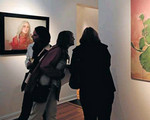
Robyn Sassen notes a wild kind of paganism in some of the works.
KERRI-JANE Evans declined to be interviewed about her exhibition that opened in Joburg last week. She was polite but firm, opting to remain out of the limelight. A career painter, Evans was trained in the late 1980s at Rhodes University in Grahamstown, from which she graduated with a distinction in painting.
She has had a chequered career — teaching, managing a hotel on an island and honing her craft through making copies of the European masters. She has lived in Gauteng and North West, Madagascar and India, before moving back to South Africa about five years ago. Although she is arguably one of the finest painters in South Africa, little is known about her personal life, other than that she was born in 1967 and has two Three days after the opening of her exhibition, more than a quarter of the 28 works had been sold daughters.
Even her Facebook page is mostly an online display of her paintings. "The process is all important to me," she wrote in 2007. "1 do not plan my work; it begins without the conditioning of idea or even conception. It is through the action of painting that the compositions arrive, the figures move and adjust in relationship ... they come and go and are my primary vehicle of expression.
"Figurative representation is where I find my greatest delight — that sense of pleasure and identification with the emotional aspects of life." And she is not exaggerating. You would imagine that figure studies and portraits of strangers are too personal, too specific to appeal to a broader audience. But the fabric of her work — the wovenness of brush strokes and colour that create the texture of a face, a torso, an arm, and give it palpable life — is such that you are drawn by the work itself, not its subject matter.
Making a living from one's creative work is a challenge not 'We are Here' by Kerri-Jane Evans is at the Everard Read Gallery in Rosebank, Johannesburg, until March 29 for the faint of heart or fickle of discipline. Even after a sellout exhibition, there is little profit to be had: after the gallery has taken its prearranged cut, which can be more than 50% of the price, there are tax and discounts, the cost of putting together a show and the cost of eating while you are working.
They all mount up dizzyingly. By virtue of how Evans positions herself in the market — her work commands prices of up to six digits — she disagrees with this focus. She does not allow herself to digress into theorising about the work, or trot around with trends and contemporary fashions in the making of art. She is certainly not a stranger to the idea of selling all her works on show.
Three days after the opening of her current exhibition, titled "We are Here", at Joburg's Everard Read Gallery, more than a quarter of the 28 works, uncompromisingly traditional in their sense of craft, had already been sold. Looking at her exhibition of paintings of young women — some clothed, some nude, some in bodies of water, some deeply ponderous — you might think of the work of Lucian Freud. But there is a bit of Dutch painter Rembrandt there, a touch of German draftsman Albrecht Duren Evans manipulates colour and light to form a soul on her canvases.
There is no shilly-shallying into self-consciousness or coyness; there is a wild kind of paganism in the gestures in some of the works.
By: Robyn Sassen
Article Source: SUNDAY TIMES
